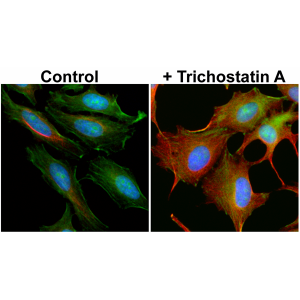anti-Acetyl-alpha-Tubulin (Lys40) Rabbit Monoclonal (RM318)
| Code | Size | Price |
|---|
| REV-31-1204-00-R100 | 100 ul | £497.00 |
Quantity:
Prices exclude any Taxes / VAT
Overview
Antibody Isotype: Rabbit IgG
Antibody Clonality: Recombinant Antibody
Antibody Clone: RM318
Regulatory Status: RUO
Applications:
- Immunocytochemistry (ICC)
- Western Blot (WB)
Shipping:
Blue Ice
Storage:
+4°C
Images
Documents
Further Information
Alternate Names/Synonyms:
alpha-Tubulin K40ac
Concentration:
N/A
EClass:
32160000
Form (Short):
liquid
Formulation:
Liquid. 50% Glycerol/PBS with 1% BSA and 0.09% sodium azide.
Handling Advice:
Avoid freeze/thaw cycles.
Immunogen:
An acetyl-peptide corresponding to Acetyl- alpha-Tubulin (Lys40).
Long Description:
Recombinant Antibody. This antibody reacts to alpha-Tubulin acetylated at Lysine 40. No cross reactivity to non-acetylated alpha-Tubulin at Lysine 40. This antibody may also react to mouse or rat Acetyl- alpha-Tubulin at Lysine 40, as predicted by immunogen homology. Applications: WB, ICC. Source: Rabbit. Liquid. 50% Glycerol/PBS with 1% BSA and 0.09% sodium azide. Microtubules are key elements of the eukaryotic cytoskeleton that dynamically assemble from heterodimers of α- and β-tubulin. Two different mechanisms can generate microtubule diversity: the expression of different α- and β-tubulin genes, referred to as tubulin isotypes, and the generation of posttranslational modifications (PTMs) on α- and β-tubulin. Tubulin PTMs include the well-known acetylation or phosphorylation, and others that have so far mostly been found on tubulin, detyrosination/tyrosination, polyglutamylation and polyglycylation. These PTMs might have evolved to specifically regulate tubulin and microtubule functions. Tubulin acetylation was discovered on K40 of flagellar α-tubulin in Chlamydomonas reinhardtii and is generally enriched on stable microtubules in cells. It is located on the microtubule lumenal surface. As a result of its localization at the inner face of microtubules, K40 acetylation might rather affect the binding of microtubule inner proteins, a poorly characterized family of proteins. Functional experiments in cells have further suggested that K40 acetylation regulates intracellular transport by regulating the traffic of kinesin motors probably by indirect mechanisms. Acetyltransferase α-Tat1 (or Mec-17) specifically acetylate α-tubulin K40. Acetylation of tubulin by α-Tat1 accumulates selectively in stable, long-lived microtubules thus explaining the link between this posttranslational modication and stable microtubules in cells. However, the direct cellular function of K40 acetylation on microtubules is still unclear.
NCBI, Uniprot Number:
P68363
Package Type:
Vial
Product Description:
Microtubules are key elements of the eukaryotic cytoskeleton that dynamically assemble from heterodimers of alpha- and beta-tubulin. Two different mechanisms can generate microtubule diversity: the expression of different alpha- and beta-tubulin genes, referred to as tubulin isotypes, and the generation of posttranslational modifications (PTMs) on alpha- and beta-tubulin. Tubulin PTMs include the well-known acetylation or phosphorylation, and others that have so far mostly been found on tubulin, detyrosination/tyrosination, polyglutamylation and polyglycylation. These PTMs might have evolved to specifically regulate tubulin and microtubule functions. Tubulin acetylation was discovered on K40 of flagellar alpha-tubulin in Chlamydomonas reinhardtii and is generally enriched on stable microtubules in cells. It is located on the microtubule lumenal surface. As a result of its localization at the inner face of microtubules, K40 acetylation might rather affect the binding of microtubule inner proteins, a poorly characterized family of proteins. Functional experiments in cells have further suggested that K40 acetylation regulates intracellular transport by regulating the traffic of kinesin motors probably by indirect mechanisms. Acetyltransferase alpha-Tat1 (or Mec-17) specifically acetylate alpha-tubulin K40. Acetylation of tubulin by alpha-Tat1 accumulates selectively in stable, long-lived microtubules thus explaining the link between this posttranslational modication and stable microtubules in cells. However, the direct cellular function of K40 acetylation on microtubules is still unclear.
Purity:
Protein A purified.
Source / Host:
Rabbit
Specificity:
This antibody reacts to alpha-Tubulin acetylated at Lysine 40. No cross reactivity to non-acetylated alpha-Tubulin at Lysine 40. This antibody may also react to mouse or rat Acetyl- alpha-Tubulin at Lysine 40, as predicted by immunogen homology.
Transportation:
Non-hazardous
UNSPSC Category:
Primary Antibodies
UNSPSC Number:
12352203
Use & Stability:
Stable for at least 1 year after receipt when stored at -20°C.



